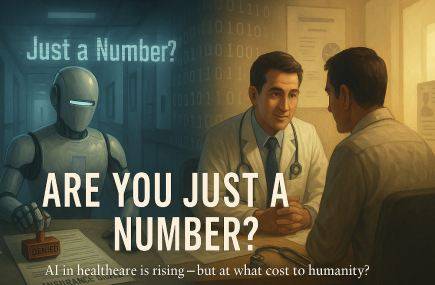The Role of AI in Modern Healthcare
AI has revolutionized the medical world by offering efficiency, speed, and predictive analysis. The best example can be hospitals, insurance companies, and medical networks that utilize AI for diagnosis, recommended treatment, and insurance claim approval or rejection. But as warned by Martin S. Finkelstein, MD, “Insurance company computers and Electronic Health Records deal well with conditions and disorders but cannot adjust to the needs of every patient and what is unique about each situation” in a satisfactory manner. AI has its benefits, but of course it comes with a myriad of hazards as well.
The Risks of Over-Automation
AI is more concerned with placing patients along statistical probabilities and standard treatment protocol. Such a mechanism may work in well-defined, routine cases but would usually fail when confronted with all the variables presented by complex and unique medical situations. For all possible reasons, incorrect diagnosis and inappropriate treatment and lack of personalization become inevitable with increasing dependency on AI.
1. Lack of Personalized Care
The systems driven by AI run on algorithms that tend to treat the generality of cases instead of the particulars of individual patients. Very often, health circumstances do not perfectly fit any of the predetermined categories. “Computers have no brains… humans have the brains, and they should use them,” says Finkelstein. Patients relying entirely on AI-driven diagnoses will lose out on caring nuances.
2. Automated Insurance Denials
Insurance plans are advancing more into the territory of AI adoption for approval and disapproval of claims with scant human review by a doctor. These systems tend to fix their eyes on saving a buck and often reject necessary treatment because it was not on the predefined list of things to do. Patients, therefore, fall prey to an appeal process that works more in favor of system bureaucracy than the welfare of the individual.
3. Errors in AI Decision-Making
An AI system’s efficacy depends on the quality of data it has been programmed to consider. Biased or incomplete data input in an AI system can lead to incorrect assumptions on diagnosis and therapy. Also, an AI system is not perfect. It can also make errors in analyzing medical images, predicting the progress of diseases, and calculating dosages of medicines.
4. Reduced Doctor-Patient Interaction
Hospitals and clinics are increasingly utilizing AI and automated systems, which leads to a heavy requirement on doctors to interact with computers and minimize the time they spend with patients. It forces doctors to utilize their time in entry of heaps of data falling under the category of Electronic Health Records that leave little time for a real spoken conversation between a doctor and a patient. Hence, it becomes a depersonalized format where treatment is done, and the patient feels nothing more than being another number in the system.
How to Protect Yourself in an AI-Driven Healthcare System
It is true that AI is penetrating into each and every part of life these days including medicine, but what patients can do is to take steps that can ensure that they would receive quality human-centered care.
1. Consult other doctors for their opinion
These so-called diagnosis and treatment plans will not be final based on AI alone, and patients should always seek the opinion of a human doctor about something that is rather complex or serious.
2. Contest Automated Denials
Never accept an automatic denial. In case a denial comes from an AI, appeal it and request for a human medical review of the decision. Most denials are overturned when appealed.
3. Individual Consultations.
For example, after visiting a doctor, you may ask for a detailed explanation of all the diagnostic and treatment recommendations that relate to the specific history of your case and not just “cookie-cutter” Patient portals are good, but they cannot engage in serious discussion. AI-driven recommendations from some other patient.
4. Be aware about AI in healthcare.
Learn about how AI is used in delivering medicate decisions. Find out what patient rights are and advocate for policies ensuring AI supports other human medical expertise rather than being a sole factor.
The Future of AI in Healthcare: A Balanced Approach
AI may forever alter healthcare. With the lucrative promise of improving diagnostic assessment, maintaining medical records, and enhancing preventive care AI is rapidly gaining traction. AI should merely be an assisting tool that helps doctors whenever needed and not a kind of machine given to autonomous dictation of patient care.
Patients must still assert themselves during the entire course of their own healthcare journey. By self-educating, questioning the decisions powered by AI, and standing for their rights, they would guarantee that technology is there to serve them rather than to control them.
To learn more about how corporatized healthcare affects on your life, visit Corporatized, Managed Healthcare: Your Health – Your Choices – Your Distress – My Dismay, by Martin S. Finkelstein, MD.

